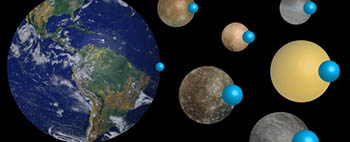
The next time someone asks you where the biggest ocean is, point them toward Jupiter. While Earth harbours about 320 million cubic miles (1,333 cubic km) of water, our planet is practically a desert compared to the rest of the Solar System.
дёӢеӣһжңүдәәй—®дҪ е“ӘдёӘжҳҹзҗғзҡ„жө·жҙӢжңҖе®Ҫе№ҝпјҢдҪ е°ұиҜҙжңЁжҳҹгҖӮе°Ҫз®Ўең°зҗғжӢҘжңү3.2дәҝз«Ӣж–№иӢұйҮҢпјҲ1333з«Ӣж–№еҚғзұіпјүж°ҙиө„жәҗпјҢжҲ‘们зҡ„жҳҹзҗғзӣёжҜ”еӨӘйҳізі»зҡ„е…¶д»–жҳҹзҗғиҖҢиЁҖз®Җзӣҙе°ұжҳҜдёҖзүҮжІҷжј гҖӮ
A moon of Jupiter called Europa, for example, which is roughly the size of our own Moon, likely hides a subsurface ocean with more than twice as much water as there is on Earth.
жҜ”еҰӮпјҢжңЁжҳҹзҡ„дёҖйў—еҗҚеҸ«ж¬§зҪ—е·ҙпјҲжңЁеҚ«дәҢпјүзҡ„еҚ«жҳҹпјҢдҪ“з§Ҝе’ҢжҲ‘们зҡ„жңҲзҗғе·®дёҚеӨҡпјҢеҸҜиғҪйҡҗи—ҸзқҖдёҖзүҮж¬ЎиЎЁеұӮжө·жҙӢпјҢж°ҙйҮҸжҳҜең°зҗғзҡ„дёӨеҖҚеӨҡгҖӮ
Yet even that pales in comparison to EuropaвҖҷs neighbour Ganymede; more than 30 times as much water as our home planet is thought to reside there as liquid and ice.
еҚідҫҝжӢҘжңүиҝҷж ·зҡ„ж°ҙйҮҸпјҢжңЁеҚ«дәҢзӣёжҜ”йӮ»жҳҹжңЁеҚ«дёүеҚҙжҳҜзӣёеҪўи§Ғз»ҢпјӣжңЁеҚ«дёүжӢҘжңүзҡ„ж¶ІжҖҒе’ҢеӣәжҖҒж°ҙйҮҸи¶…иҝҮдәҶең°зҗғж°ҙйҮҸзҡ„30еҖҚгҖӮ
And scientists keep finding more water wherever they look. On September 28, researchers reported that Dione - a small moon of Saturn - probably has a subsurface ocean, too.
иҖҢдё”пјҢ科еӯҰ家иҝҳеңЁдёҚж–ӯеҸ‘зҺ°ж°ҙиө„жәҗдё°еҜҢзҡ„жҳҹзҗғгҖӮ9жңҲ28ж—ҘпјҢз ”з©¶дәәе‘ҳжҠҘе‘Ҡз§°пјҢеңҹжҳҹзҡ„дёҖйў—е°ҸеҚ«жҳҹеңҹеҚ«еӣӣеҫҲеҸҜиғҪд№ҹжӢҘжңүдёҖзүҮж¬ЎиЎЁеұӮжө·жҙӢгҖӮ
To see just how Earth stacks up agains other ocean worlds, Business Insider contacted Steve Vance, a planetary scientist at NASAвҖҷs Jet Propulsion Laboratory whoвҖҷs crunched the numbers on just how much water might be out there.
дёәдәҶеј„жё…ең°зҗғеңЁеӨӘйҳізі»жө·жҙӢдё–з•Ңзҡ„е®һеҠӣпјҢе•ҶдёҡеҶ…幕зҪ‘иҒ”зі»дәҶзҫҺеӣҪе®ҮиҲӘеұҖе–·ж°”жҺЁиҝӣе®һйӘҢе®Өзҡ„иЎҢжҳҹ科еӯҰ家еҸІи’ӮеӨ«•еҮЎжҖқпјҢд»–иҝҗз®—еҮәдәҶе…¶д»–жҳҹзҗғзҡ„ж°ҙйҮҸж•°жҚ®гҖӮ
The to-scale graphic below uses VanceвҖҷs data to show the plausible volumes of water (both liquid and ice) for the nine ocean worlds verified so far:
дёӢйқўзҡ„иҝҷеј зӯүжҜ”дҫӢз»ҳеҲ¶еӣҫиҝҗз”ЁеҮЎжҖқзҡ„ж•°жҚ®жҳҫзӨәеҮәеҲ°зӣ®еүҚдёәжӯўе·ІиҜҒе®һзҡ„еӨӘйҳізі»д№қеӨ§иЎҢжҳҹжө·жҙӢзҡ„зҗҶи®әж°ҙйҮҸпјҲеҢ…жӢ¬ж¶ІжҖҒе’ҢеӣәжҖҒж°ҙпјүпјҡ
In order of how much water they have, from the least to the most, they are: Enceladus, Dione, Earth, Europa, Pluto, Triton, Callisto, Titan, and Ganymede.
жҢүз…§жӢҘжңүзҡ„ж°ҙйҮҸжҺ’еәҸпјҢд»Һе°‘еҲ°еӨҡдҫқж¬ЎжҳҜпјҡеңҹеҚ«дәҢпјҢеңҹеҚ«еӣӣпјҢең°зҗғпјҢжңЁеҚ«дәҢпјҢеҶҘзҺӢжҳҹпјҢжө·еҚ«дёҖпјҢжңЁеҚ«еӣӣпјҢеңҹеҚ«е…ӯе’ҢжңЁеҚ«дёүгҖӮ
Mimas, a moon of Saturn, and Ceres, the largest asteroid in the Solar System, are also thought to have subsurface oceans - but scientists arenвҖҷt yet sure how big each one might be.
еңҹжҳҹзҡ„еҚ«жҳҹеңҹеҚ«дёҖе’ҢеӨӘйҳізі»жңҖеӨ§е°ҸиЎҢжҳҹи°·зҘһжҳҹд№ҹиў«и®ӨдёәжӢҘжңүж¬ЎиЎЁеұӮжө·жҙӢпјҢдҪҶ科еӯҰ家е°ҡдёҚиғҪзЎ®е®ҡиҝҷдёӨйў—жҳҹзҗғдёҠзҡ„жө·жҙӢжңүеӨҡеӨ§гҖӮ












